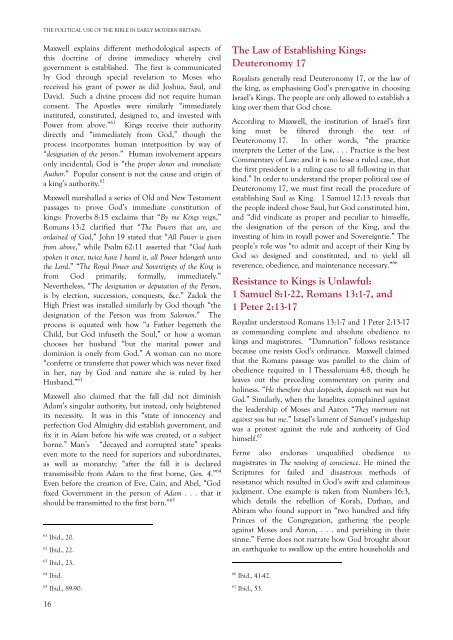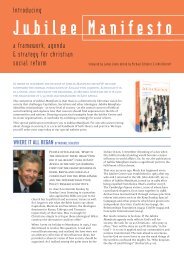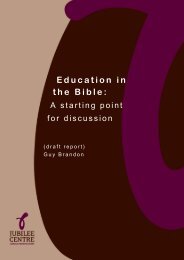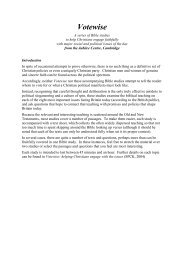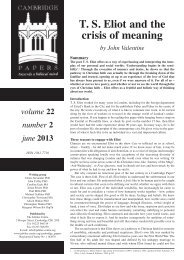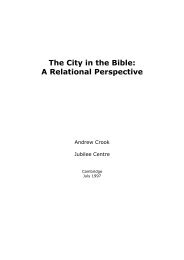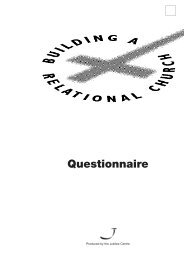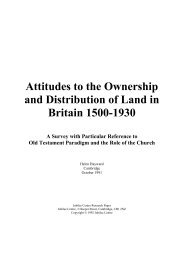Report Template - Jubilee Centre
Report Template - Jubilee Centre
Report Template - Jubilee Centre
You also want an ePaper? Increase the reach of your titles
YUMPU automatically turns print PDFs into web optimized ePapers that Google loves.
THE POLITICAL USE OF THE BIBLE IN EARLY MODERN BRITAIN:<br />
Maxwell explains different methodological aspects of<br />
this doctrine of divine immediacy whereby civil<br />
government is established. The first is communicated<br />
by God through special revelation to Moses who<br />
received his grant of power as did Joshua, Saul, and<br />
David. Such a divine process did not require human<br />
consent. The Apostles were similarly “immediately<br />
instituted, constituted, designed to, and invested with<br />
Power from above.” 61 Kings receive their authority<br />
directly and “immediately from God,” though the<br />
process incorporates human interposition by way of<br />
“designation of the person.” Human involvement appears<br />
only incidental; God is “the proper donor and immediate<br />
Author.” Popular consent is not the cause and origin of<br />
a king’s authority. 62<br />
Maxwell marshalled a series of Old and New Testament<br />
passages to prove God’s immediate constitution of<br />
kings: Proverbs 8:15 exclaims that “By me Kings reign,”<br />
Romans 13:2 clarified that “The Powers that are, are<br />
ordained of God,” John 19 stated that “All Power is given<br />
from above,” while Psalm 62:11 asserted that “God hath<br />
spoken it once, twice have I heard it, all Power belongeth unto<br />
the Lord.” “The Royal Power and Sovereignty of the King is<br />
from God primarily, formally, immediately.”<br />
Nevertheless, “The designation or deputation of the Person,<br />
is by election, succession, conquests, &c.” Zadok the<br />
High Priest was installed similarly by God though “the<br />
designation of the Person was from Salomon.” The<br />
process is equated with how “a Father begetteth the<br />
Child, but God infuseth the Soul,” or how a woman<br />
chooses her husband “but the marital power and<br />
dominion is onely from God.” A woman can no more<br />
“conferre or transferre that power which was never fixed<br />
in her, nay by God and nature she is ruled by her<br />
Husband.” 63<br />
Maxwell also claimed that the fall did not diminish<br />
Adam’s singular authority, but instead, only heightened<br />
its necessity. It was in this “state of innocency and<br />
perfection God Almighty did establish government, and<br />
fix it in Adam before his wife was created, or a subject<br />
borne.” Man’s “decayed and corrupted state” speaks<br />
even more to the need for superiors and subordinates,<br />
as well as monarchy; “after the fall it is declared<br />
transmissible from Adam to the first borne, Gen. 4.” 64<br />
Even before the creation of Eve, Cain, and Abel, “God<br />
fixed Government in the person of Adam . . . that it<br />
should be transmitted to the first born.” 65<br />
61<br />
Ibid., 20.<br />
62<br />
Ibid., 22.<br />
63<br />
Ibid., 23.<br />
64<br />
Ibid.<br />
65<br />
Ibid., 89-90.<br />
The Law of Establishing Kings:<br />
Deuteronomy 17<br />
Royalists generally read Deuteronomy 17, or the law of<br />
the king, as emphasising God’s prerogative in choosing<br />
Israel’s Kings. The people are only allowed to establish a<br />
king over them that God chose.<br />
According to Maxwell, the institution of Israel’s first<br />
king must be filtered through the text of<br />
Deuteronomy 17. In other words, “the practice<br />
interprets the Letter of the Law, . . . Practice is the best<br />
Commentary of Law: and it is no lesse a ruled case, that<br />
the first president is a ruling case to all following in that<br />
kind.” In order to understand the proper political use of<br />
Deuteronomy 17, we must first recall the procedure of<br />
establishing Saul as King. 1 Samuel 12:13 reveals that<br />
the people indeed chose Saul, but God constituted him,<br />
and “did vindicate as proper and peculiar to himselfe,<br />
the designation of the person of the King, and the<br />
investing of him in royall power and Sovereigntie.” The<br />
people’s role was “to admit and accept of their King by<br />
God so designed and constituted, and to yield all<br />
reverence, obedience, and maintenance necessary.” 66<br />
Resistance to Kings is Unlawful:<br />
1 Samuel 8:1-22, Romans 13:1-7, and<br />
1 Peter 2:13-17<br />
Royalist understood Romans 13:1-7 and 1 Peter 2:13-17<br />
as commanding complete and absolute obedience to<br />
kings and magistrates. “Damnation” follows resistance<br />
because one resists God’s ordinance. Maxwell claimed<br />
that the Romans passage was parallel to the claim of<br />
obedience required in 1 Thessalonians 4:8, though he<br />
leaves out the preceding commentary on purity and<br />
holiness. “He therefore that despiseth, despiseth not man but<br />
God.” Similarly, when the Israelites complained against<br />
the leadership of Moses and Aaron “They murmure not<br />
against you but me.” Israel’s lament of Samuel’s judgeship<br />
was a protest against the rule and authority of God<br />
himself. 67<br />
Ferne also endorses unqualified obedience to<br />
magistrates in The resolving of conscience. He mined the<br />
Scriptures for failed and disastrous methods of<br />
resistance which resulted in God’s swift and calamitous<br />
judgment. One example is taken from Numbers 16:3,<br />
which details the rebellion of Korah, Dathan, and<br />
Abiram who found support in “two hundred and fifty<br />
Princes of the Congregation, gathering the people<br />
against Moses and Aaron, . . . and perishing in their<br />
sinne.” Ferne does not narrate how God brought about<br />
an earthquake to swallow up the entire households and<br />
66<br />
Ibid., 41-42.<br />
67<br />
Ibid., 53.<br />
16


